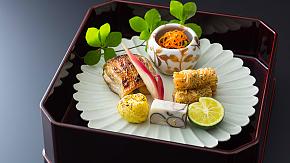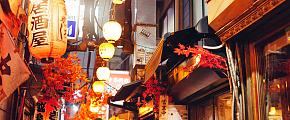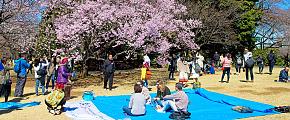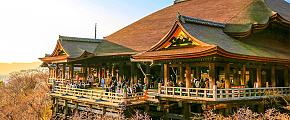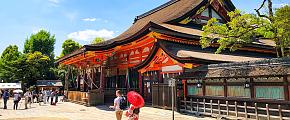10 Things Not to Do in Japan
Common sense varies from place to place. Rules that apply in your country may not fit in Japan, and vice versa. Japan is known as a country of manners, with unique etiquette and rules. Failing to follow them can sometimes be a big problem, so it's a good idea to check out the top things not to do before taking a trip to Japan.
- Talk or Make Phone Calls Loudly
- Enter the Train Tracks
- Smoke in a Non-Designated Area
- Take Photos Without Consent
- Enter Someone's House With Shoes On
- Take Food From Shared Plates by Your Chopsticks
- Leave the Food at the Restaurant
- Eating While Walking
- Not Following the Rules for Garbage Disposal
- Enter Onsen Without Bathing or With a Towel
Talk or Make Phone Calls Loudly on Public Transport
It is common for people to take out their smartphones to kill some time when they are on the train or other public transport, such as playing games, watching videos, or chatting with friends. However, talking on the phone on the train seems to be commonplace overseas, but it's considered bad manners in Japan.
Japanese people often only use email and chat apps on public transport. There is no problem exchanging messages, but if you make a phone call on the train, most people will think you are being rude. If you need to talk on the phone, lower your voice and it is better to do so when you get off the train or bus.
The volume of your voice should also be considered when talking to your friends or other passengers. Although it varies from region to region, this is particularly important on crowded trains. In the case of Tokyo, the more people there are on the train, the less people talk.
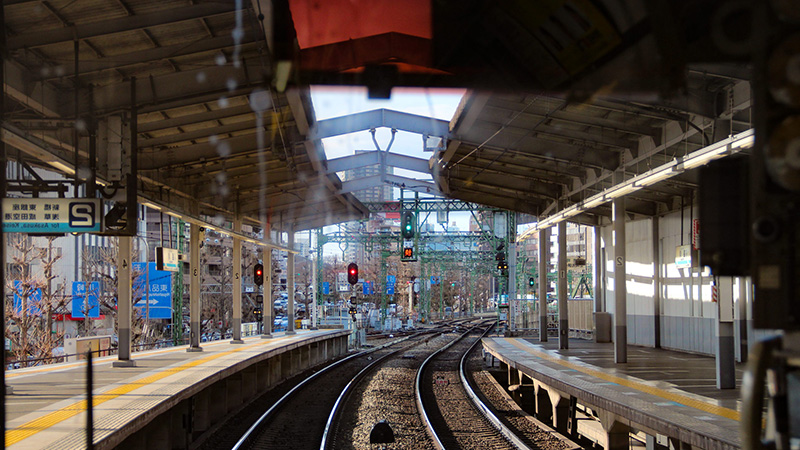 Japan Train Sation
Japan Train Sation
Enter the Train Tracks
In Japan, trains in Kamakura are very popular with tourists, especially fans of Japanese manga( or anime) "Slam Dunk". Since Kamakura is the main stage of the story, it might be common to see visitors stay on the tracks until the train comes, or hold the camera so close that they almost hit the train.
However, in Japan, it is forbidden to enter train tracks, even when the train is not running. You can cross the train track quickly. However, a stay is always not recommended. Such behaviors may lead to train delays and may cause inconvenience to many people.
Taking pictures on the railroad tracks might give you a nice view of the scenery, however, try to take this type of picture on the train rather than on the tracks. Placing stones or objects that could sabotage trains on the tracks is also prohibited. Please be careful if you are traveling with children.
 Kamakura Kokomae Station
Kamakura Kokomae Station
Smoke in a Non-Designated Area
It is polite to smoke only in designated areas out of respect for non-smokers in Japan. But where to smoke would be confusing for most international tourists.
In Japan, smoking is illegal in public indoor spaces (restaurants, cafes, bars, etc.), partially enclosed spaces (buildings with open roofs or walls, bus stops, etc.), and in the workplace.
While you can smoke indoors in designated areas, smoking is prohibited on the streets of Tokyo. There are areas where you may be fined for smoking while walking, and you can also face penalties for littering or throwing cigarette butts on the ground.
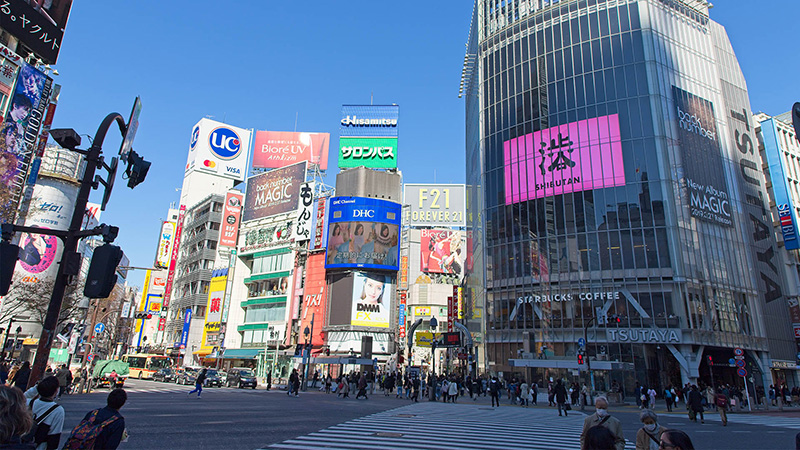 Street of Tokyo
Street of Tokyo
Take Photos Without Consent
Before taking a photo, always check whether photography is allowed in the area. If you're not sure, don't hesitate to ask people around you.
In Japan, photography is often prohibited in museums and galleries to protect copyright, and this is strictly enforced. Also, note that some shopping malls and cafes may restrict photography of other people.
It's also not allowed to photograph books and magazines in bookstores and libraries, or films in cinemas, as this is considered 'digital shoplifting'.
In hot springs, photography is prohibited as well. If you wish to take photos, always ask for permission first. Even with consent, avoid photographing other bathers. Also, never post such photos online.
Enter Someone's House With Shoes On
In Japan, one way to clearly distinguish between the inside and outside of a building is the practice of not wearing shoes indoors.
The act of "taking off one's shoes" means submitting to the rules of the building. In other words, it shows a lack of hospitality, respect, and trust for the other person.
Of course, there are also hygiene reasons. Therefore, most Japanese still don't wear shoes inside their homes. Instead, they may wear indoor shoes such as slippers, but they are clearly distinguished from shoes for outside.
Even if you may not have so many opportunities to visit Japanese houses, be careful with the rules regarding shoes when entering Japanese-style spaces such as shrines and temples, inns, and restaurants.
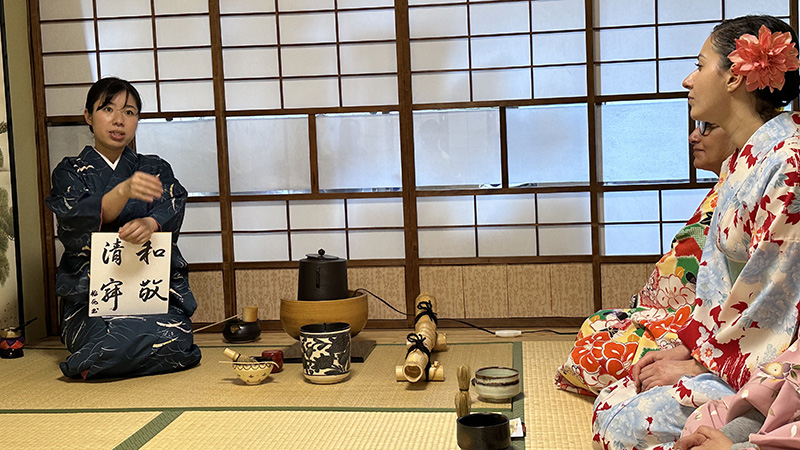 Japanese-style Teahouse
Japanese-style Teahouse
Take Food From Shared Plates With Your Chopsticks
When enjoying Japanese cuisine, especially meals served on large platters, you may notice extra chopsticks or utensils provided. Don't worry; this isn't a mistake by the restaurant staff - it's perfectly normal in Japan.
Since using personal chopsticks to take food from a shared dish is considered bad manners here, these extra utensils are intended as public tools for sharing food among friends and family.
Of course, if you are comfortable doing so, you can simply use your own chopsticks when sharing meals with friends and family. In some countries that also use chopsticks, like China and Korea, such practices may not be viewed as improper. However, it's important to keep this custom in mind when dining with Japanese friends or attending a local family dinner.
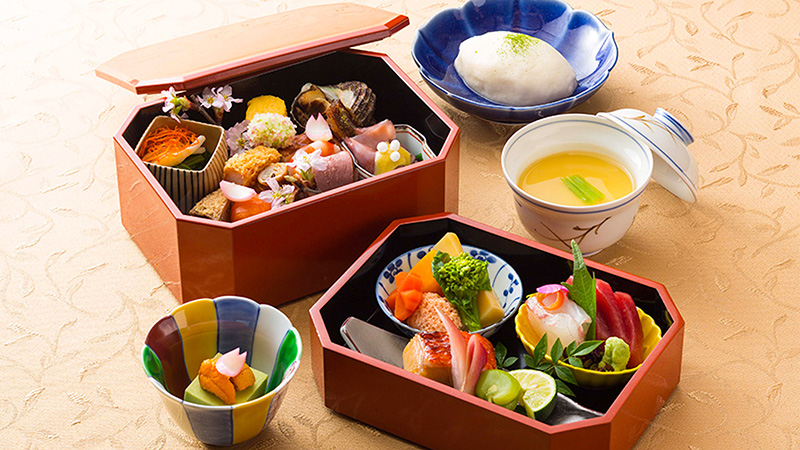 Japanese Food
Japanese Food
Leave the Food at the Restaurant
Leaving food behind in Japanese restaurants is generally frowned upon. It's considered disrespectful to the person who prepared the meal, as it signifies disregard for the effort put into making it.
In Japan, wasting food is viewed as bad manners. While takeaway food has become popular in many countries, it hasn't widely caught on in Japan, probably due to cultural differences.
If issues arise with take-out food, the restaurant may be held fully responsible, which adds to the hesitation around this practice. However, some restaurants may allow diners to take leftovers home if permission is granted. Remember not to disturb the restaurant when making your request.
Eating While Walking
For some, enjoying street food while sightseeing is a pleasure. However, eating while walking is discouraged in some popular Japanese tourist cities like Kyoto and Kamakura. This is largely due to complaints about food stains on clothing from those nearby.
Another important consideration is littering after eating. In many areas of Japan, there are no rubbish bins, and improper disposal of waste can spoil the scenery and cause inconvenience to local residents.
While older Japanese may stare at you or warn you not to eat while walking, younger generations tend to be more accepting. Still, it's best to find a place to eat, such as outside a convenience store, the eatery in front of the stalls, or the specified areas for eating on the go.
Not Following the Rules for Proper Garbage Disposal
You may be impressed by the beauty and cleanliness of Japan's cities, where trash cans are often scarce due to anti-terrorism measures. When it comes to littering, please make sure to dispose of waste according to the sorting signs.
Garbage sorting methods can vary by location, but typically there are four categories: newspapers and magazines, cans and bottles, plastic bottles, and general waste, each identifiable by icons.
Hotels may not provide separate bins for each type of waste, so in those cases, you can go directly to the trash without worrying about sorting. When checking out, be sure to throw away any unnecessary items, as it may be difficult to find a trash can later.
To make your sightseeing experience more convenient, consider carrying a small plastic bag for your trash. This will help you keep waste organized while on the go.
Enter Onsen Without Taking a Shower or With a Towel
Before enjoying a relaxing soak in the hot springs, it's essential to rinse your body with hot water. This step helps your body adjust to the temperature and reduces strain on your system.
Next, make sure to thoroughly cleanse yourself before entering the onsen. Washing your body first prevents dirt from contaminating the water.
When using a towel in the hot spring, be mindful not to let it soak in the bath. If you submerge a towel while wrapped around you, it can introduce dirt, soap scum, and other debris into the water, diminishing the cleanliness of the tub.
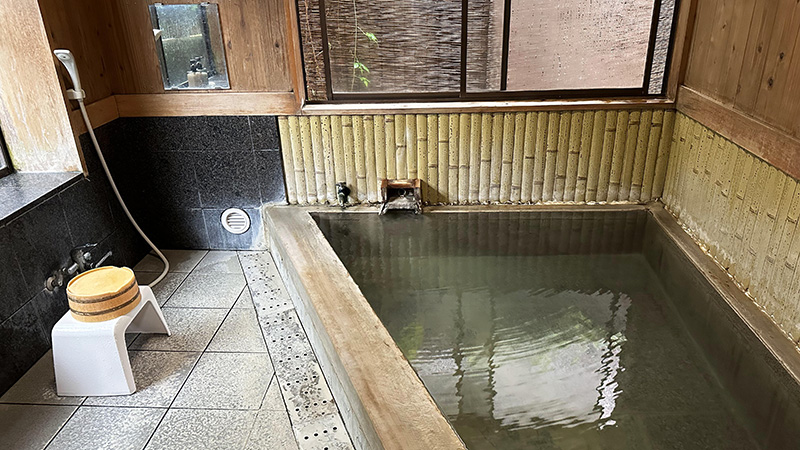 Shower before Onsen
Shower before Onsen
It would be always nice to understand the basics of manners concerning the local people. If you're planning a Japan trip but don't know how to start, please don't hesitate to contact us, just simply tell us your interests and needs, and one of our travel experts will create a tailor-made itinerary for you.
Quick Question
What Our Clients Say
Explore the latest verified reviews of Odynovo's travel services on Tripadvisor, Google, Trustpilot, Product Review and more trusted platforms.
SUBSCRIBE TO WIN A FREE TOUR
Subscribe to our newsletter for a chance to win a free 7-day tour to India! And more insider travel news, exclusive offers, and inspiration will be sent straight to your inbox. Check our previous newsletters and get some sparks.

